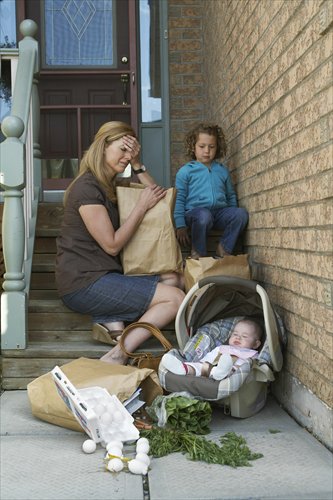Without a support system, expat mothers are more vulnerable to postpartum depression

Expat moms, isolated from their families, are at a higher risk for postpartum depression. Photo: IC
Kate Miller's eyes turned red when she went to an obstetrician for help and was asked "How are things at home with your baby?"
Miller, 31, a British mom based in Beijing, has been suffering from constant feelings of frustration, sadness and hopelessness since she gave birth to a baby boy one year ago. After talking with the obstetrician, she was diagnosed with postpartum depression (PPD), a form of clinical depression that significantly interferes with a new mother's ability to take care of herself or her baby.
As one of many expat mothers who live in a foreign country far away from home, friends and a social support system, Miller felt it was extremely difficult to get used to her new identity and life in an unacquainted environment.
According to a report on June 2, from the medical news website reference.medscape.com, during the postpartum period, up to 85 percent of women experience some sort of mood disturbance with 10-15 percent experiencing a more persistent form of depression. The American Academy of Pediatrics estimates that more than 400,000 infants are born each year to mothers who are depressed. There are various causes that range from hormonal shifts to life crises to pre-existing depression.
There are other causes that make expat moms especially vulnerable. Factors including limited ability to speak and communicate in Chinese, inconvenient overseas calls due to time differences, the lack of a reliable social support network and tricky access to postpartum services can all be triggers for PPD.
According to Dr Juliette Kinn, a French obstetrician and gynecologist at Oasis International Hospital based in Beijing, a great number of expat moms suffer from some sort of baby blues after they give birth. For those who are trapped in severe depression, suicidal thoughts may enter and if left untreated, the child can be affected emotionally.

Symptoms of postpartum depression include crying, loss of appetite and hopelessness. Photo: IC
Expats prone to PPD
Miller gave birth to a healthy baby boy by Cesarean, but she kept bleeding seven hours after the C-section.
"I though I was dying," Miller said. "I only had my husband by my side and he panicked. I saw local mothers nearby being comforted by their parents and in-laws. I was wrapped in great despair and loneliness."
After returning home with the baby, Miller video-chatted with her parents, but she felt video-chat could not measure up to being together and supporting each other in person.
"Beijing is seven hours ahead of London. When I was awake, my family was sleeping and by the time they woke up I was exhausted and too sleepy to chat. When it worked out that we were all awake and able to call or video-chat, my moment of need was gone," Miller recalled.
Language barriers and the pollution in Beijing compound mental vulnerability.
Miller's husband worked full-time, so she sometimes had to leave the house for essentials. This simple task was very difficult because she had not fully recovered from the birth. Taking a taxi was just as difficult since she could not communicate with Chinese drivers.
"Sometimes the loneliness and helplessness brought tears to my eyes as I stood on the street with two heavy bags in my hand," she said.
The pollution in Beijing was also an added stress. She had to bring her newborn baby outside since there was no one at home to take care of him. She was forced to put a mask on herself and her baby, and still felt breathless, both physically and emotionally.
"My poor baby had to breathe the dirty air and the stress from worrying about his health made me depressed."
According to a report from Wall Street Journal in May, postpartum anxiety and depression aren't novel concepts around the world, but living far from home can make a new mother even more defenseless to the effects. If the baby blues start to spiral out of control, expats are at an even greater disadvantage. Anxiety or depression with communication difficulties, cultural differences, geographical obstacles and barriers to getting help, can feel insurmountable, said the report.
Chinese family: cure or poison?
Expat moms with Chinese husbands are believed to be more fortunate since they have help from their Chinese in-laws. However, this is a common misconception.
Marie Harper, a 28-year-old German, is an expat mother married into a Chinese family. She thought that even though she is an expat, she should have been fine in dealing with giving birth abroad because she is married to a Chinese man.
During her daughter's birth, Harper stayed with her in-laws who helped take care of her newborn, but the truth is that Harper felt she was "lonely and miserable."
According to Harper, her husband is an only child and does not know much about how to take care of others. He is accustomed to being cared for by his parents.
"I did not think it was a problem when we were dating and got married; but it turned out to be a huge problem when I gave birth. He was the first person I would turn to since my family was far away, and he disappointed me," she said.
During the first month after delivery, the baby often woke up during the night, but Harper's husband was a deep sleeper and never offered any help. She rarely had a full night's rest since she had to get up and take care of the baby in the middle of the night.
She was unable to conform to her in-laws' routine. In their 60s, her in-laws got up every day at 6 am to exercise and clean the house. Harper would be woken up and could not fall asleep again.
Also, her Chinese mother-in-law often entered her room without knocking. "I often freaked out when my mother-in-law suddenly appeared in my room. She had absolutely no sense of boundaries."
According to Zhou Yi, a senior consultant from Yutianqing Education and Technology Corporation, a psychology consulting company based in Beijing, the concept of "boundaries" is not popular among Chinese families.
For Chinese parents, it can be easy and natural for them to interfere with their kids' lives, even after their kids are married. However, it is uncommon in Western families. Therefore, during the postpartum period when new moms are facing their most vulnerable times, having a bossy Chinese mother-in-law can result in expat moms' depression, said Zhou.
In Harper's case, she was gradually turning into a robot. She did what she had to do in a mechanical way. After she fed and changed the baby, she would sit on the sofa and listen to him cry for almost half an hour, and it did not effect her at all.
"I felt I was immune to love. I could not feel love for my son, and I could not feel love for my husband, either," Harper said.
Measures to be taken
Kinn suggests new moms should have regular postpartum check-ups, that way they can get help from doctors and psychologists at an early stage if they are experiencing severe depression.
"Normally, six weeks after delivery, new moms should have a postpartum check-up where depression can be diagnosed through communication. I would ask them how it is at home and if it is difficult," Kinn said.
She asks new moms to pay special attention to symptoms such as crying all the time, loss of appetite, feeling incapable, insomnia and panicking when the baby cries; they are all signs that new moms should see a psychologist for help. If they have a history of depression and it is suspected that they have postpartum depression, then they need to have a closer follow-up with the doctors.
According to Kinn, professionals are just a part of the help that a mother needs. Fathers also play a big role in the process, especially for expat moms, most of whom do not have anywhere else to turn to for help. Dads are strongly recommended to be supportive and help moms get through this challenging time by helping and listening.
For new moms, positive lifestyle changes are also recommended. Exercise has been shown to help relieve depression, and yoga can help as well, said Miller.
"Life can be harder for an expat mom. Don't hesitate to get the right kind of help if you need," she said. "If you feel like something is wrong, do not keep these feeling to yourself. Talk to your family members, friends and doctors to get help."
Newspaper headline: A mom’s pain